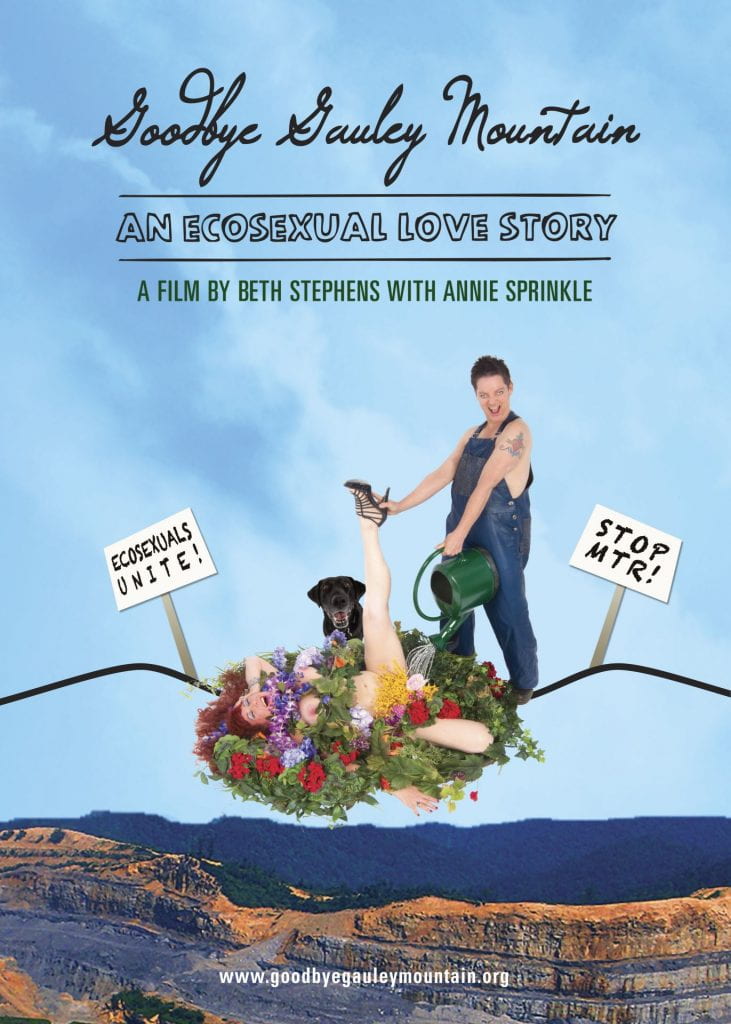
Goodbye Gauley Mountain
Trailer Goodbye Gauley Mtn: An Ecosexual Love Story from Elizabeth Stephens on Vimeo.
Goodbye Gauley Mountain: An Ecosexual Love Story is an autobiographical documentary depicting the “pollen-amorous” love affair between artist couple Beth Stephens and Annie Sprinkle, and the biodiverse Appalachian Mountains. This documentary follows Stephens and Sprinkle on a journey home to Beth’s native West Virginia, to talk to rural community members, environmental activists, family and friends in order to speak out against mountain top removal (MTR) mining practices, which are destroying the forests, towns, and people they love. Told first-person through interviews and ecosexual actions that connect them to the earth, Goodbye Mountain, braids together three main themes –the joys of ecosexuality, the destruction of MTR, and Beth’s upbringing in the heart of a West Virginia coal mining family – to address issues of environmental and social justice in the most poverty-stricken regions of the USA. Their goal is to begin mobilizing the gay, lesbian, bi, trans, inter-and eventually eco to stand up against environmental injustice everywhere. As Beth says in the film, “Gays and Lesbians can live without getting married, but they won’t survive unless they have drinking water and clean air to breath.”
Can romantic love for nature mobilize others, before it’s too late, to fight for social and environmental justice?
 The film’s structure juxtaposes ugly and beautiful, sadness and humor, to make the fight against MTR a little more sexy, fun, hopeful and diverse. We join locals in extreme tree hugging, sky gazing, rock kissing, and singing to the earth, and the film climaxes with a purple themed wedding to the Appalachian Mountains. Many of the locals interviewed gather to vow to love, honor and protect this region, which is – after the Amazon – the second most bio-diverse mountain region on earth. Through all this, we ask, how can we change our relationship from Earth as mother, to Earth as lover? Can romantic love for nature mobilize others, before it’s too late, to fight for social and environmental justice? Can the Earth feel our love? How does one ask a tree for consent before giving it a hug? How can we fight the fatigue environmental activists feel after prolonged fighting against multi-billion dollar corporations?
The film’s structure juxtaposes ugly and beautiful, sadness and humor, to make the fight against MTR a little more sexy, fun, hopeful and diverse. We join locals in extreme tree hugging, sky gazing, rock kissing, and singing to the earth, and the film climaxes with a purple themed wedding to the Appalachian Mountains. Many of the locals interviewed gather to vow to love, honor and protect this region, which is – after the Amazon – the second most bio-diverse mountain region on earth. Through all this, we ask, how can we change our relationship from Earth as mother, to Earth as lover? Can romantic love for nature mobilize others, before it’s too late, to fight for social and environmental justice? Can the Earth feel our love? How does one ask a tree for consent before giving it a hug? How can we fight the fatigue environmental activists feel after prolonged fighting against multi-billion dollar corporations?
This is the story of how Stephens and Sprinkle came to marry the Appalachian Mountains and join the fight to abolish mountain top removal. It’s a compelling story of small communities facing destruction for short-term corporate gain, but it’s also about hope and how, finding strength together, we can resist, and fight for justice in our own queer ways. These two humans are artists, environmentalists, and ecosexuals living in San Francisco who go home to West Virginia to visit Beth’s family. During their visit, they learn about the devastating practice of mountain top removal (MTR) strip mining, which is in full swing – as are its devastating effects on the mountains and their communities.
FILM CREDITS
Director: Elizabeth Stephens
Associate Director: Annie Sprinkle
Executive Producer: Elizabeth Stephens
Producers: Xandra Coe, Annie Sprinkle and Jordan Freeman
Associate Producer: Paul Corbit Brown
Editer: Keith Wilson
Cinematography: Jordan Freeman
Aerial Footage provided by Paul Corbit Brow
Production Manager: Julia Reardon
Animation: Hannah Matzner
Music: David Steinberg, Joan Jeanrenaud, Hazel Dickens, Tony’s Circus
Hospitality: Anne Harless, Damon Cater, and Susie Cater
Gaffer: Danyel Ferrari
Photo Stills: Paul Corbit Brown, Vivan Stockma and Danyel Ferrar
Participants:
Elizabeth Stephens
Annie Sprinkle
Catherine Moore
Wedding Participants
WV PFAG Gathering
Anne Harless
T. Paige Dalporto
Larry and Carol Gibson
Cindy Lilly
Joe Hampshire
Vivian Stockman
Jack Spadero
Patricia Spangler
Paul Corbit Brown
Grumble
Damon Cater
Thank you: Stray Dog Antiques
This film has been generously supported by the UCSC Arts Research Committee, UCSC’s Academic Senate Committee on Research and Xandra Coe
